What happens when Christians go to the movies?
God works in darkened theaters just as He works through music, books, and other mediums to convey His gospel. In the 1960s-1970s, moviegoers flocked to theaters every weekend for entertainment. It was the age of the mall and the introduction of multi-plex cinemas. Cable TV was in its infancy and not every home yet had a VCR. Christian movies and movies aimed at Christians had an impact. They reinforced what was happening in the “Jesus revolution,” emerging from that movement’s dynamics.
The 70s saw record-breaking blockbuster franchise films released, including The Godfather (1972), Jaws (1975), and Star Wars (1977). Christian movies and movies built around Christian themes emerged as believers explored film to communicate the gospel (and moviemakers recognized an opportunity to capitalize on the Jesus Movement through ticket sales).
These were the early days of “youth ministry,” and movies played a part as teen youth groups looked to socialize around gospel-friendly activities. Movie scores also provided opportunities for spreading Jesus music, highlighting Christian folk rock and demonstrating its place in Christian art.
Here is a sampling of movies that contributed to or were inspired by the Jesus revolution.
Photo Credit: Getty Images/hatman12

Brother Sun, Sister Moon (1972)
Christian musicians John Michael Talbot and Rich Mullins were deeply impressed with the life of St. Francis of Assisi, as were hundreds of other moviegoers, because of his portrayal in the Franco Zeffirelli film Brother Sun, Sister Moon. Inspired by the film’s example, both musicians chose to live simply and donated much of the profits they earned through their music.
The movie’s gorgeous cinematography contributed to its popularity, but the plot hit the mark with young adults impacted by the hippie movement and the Jesus revolution. Young people were anti-establishment, seeking peaceful community and life closer to the earth. This movie spoke to that moment with a powerful faith theme. Graham Faulkner plays St. Francis of Assisi from before his conversion to his radical change inspired by Christ.
Francis was raised in a wealthy family but was impacted by his war experiences (following the Vietnam War, this plot element resonated with moviegoers). Upon his return, he was deeply disturbed by his family’s attachment to material goods and the emphasis on riches by the established church. During a fevered illness, Francis has many visions of his cavalier past and during his recovery, he finds peace through Christ and engages in a life of poverty, chastity, simplicity, and service to the poor.
Francis believed God called him to rebuild the broken ruins of San Damiano church. Several friends, also disillusioned by wealth and war, join him, causing a stir in conventional society but they pressed on. The beautiful Clare, also leaving her wealthy upbringing, joined them in poverty and ministry to the poor and lepers. The movie’s soundtrack for the American version was written and performed by the popular Scottish folk-rock musician Donovan.
The film is a fictionalized version of St. Francis and the Franciscan order’s origin. Still, it impacted many young people seeking change and a deeper spirituality connected to God and peaceful community.
Further Reading: 10 Great Movies about Christian Leaders to Watch During Lent
Photo Credit: Paramount via IMDb
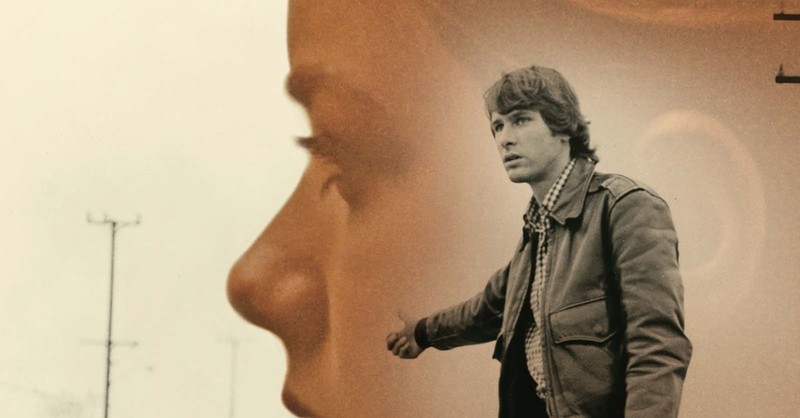
Time to Run (1973)
The Billy Graham Association produced this film through World Wide Pictures and reported that six million moviegoers saw it on release. The movie’s attraction for that period is evident. Its theme mirrored what so many families were experiencing at this time in American life—parents feeling the emptiness of worldly success and a young adult son searching for more. Add to that relevant plot line, a soundtrack featuring the folk-rock songs of Randy Stonehill and it’s clear why this film resonated with so many moviegoers.
Jeff Cole (Randall Carver from Taxi) is angry with life. He vandalizes the nuclear plant where his father (Ed Nelson from Peyton Place) is a supervisor, adding a layer of activism to a film about the emptiness of life without God and family conflict. Arguing with everyone, including his girlfriend (Barbara Sigel, nominated for a Golden Globe for her performance), Jeff takes to the road in a beat-up van. He and his family find peace and resolution by finding Jesus.
While the plot may seem simplistic and naïve now, it reflected what many were experiencing through the Jesus Movement and auditorium-size gospel presentations by Graham.
Further Reading: 4 Things You Should Know about Jesus Revolution
Photo Credit: World Wide Pictures via IMDb
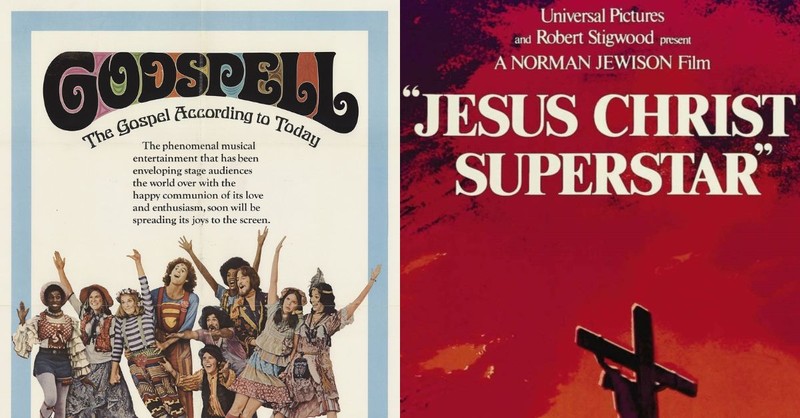
Godspell (1973) and Jesus Christ Superstar (1973)
Where to Watch Jesus Christ Superstar
Two films depicting the life of Christ spawned from an off-Broadway musical and a Broadway rock opera became huge hits in 1973.
Godspell was based on the Gospel of Matthew, featured music by Stephen Schwartz (Pippin and Wicked), and starred Victor Garber (Alias, Titanic) as Jesus. The movie went full-on hippie for costuming and depicts John the Baptist gathering disciples in New York City. The disciples then act out many of the parables from Matthew with high-energy songs and slapstick humor. The movie concludes with Jesus’ crucifixion in a junkyard, the apostles carrying out His body.
Jesus Christ Superstar was directed by Norman Jewison, a screenplay based on the Broadway rock opera by Tim Rice (Aladdin, The Lion King) and Andrew Lloyd Webber (Phantom of the Opera, Evita). The movie starred Ted Neely as Jesus, Yvonne Elliman as Mary Magdalene, and Carl Anderson as Judas. In rock opera, there are no spoken lines, only singing. The film portrays a cast of actors arriving in the desert to deliver a performance of the Passion of Christ. It covers Jesus’ final six days as viewed through the eyes of Judas.
While the music of both films resonated with young believers, they received their share of criticism. Some criticized the license taken with depicting Jesus. Godspell made him look clownish and ended with His death. Jesus Christ Superstar seemed to elevate Judas and featured an extrabiblical romance between Jesus and Mary Magdalene. While Hollywood often seeks to capitalize on the Christian audience’s hunger for Bible-based films, they frequently miss the mark in sticking close to the biblical narrative.
Further Reading: 10 Surprising Jesus Movies You Should See
Photo Credit: Gospell from Columbia Pictures via IMDb. Jesus Christ Superstar from Universal Pictures via IMDb.
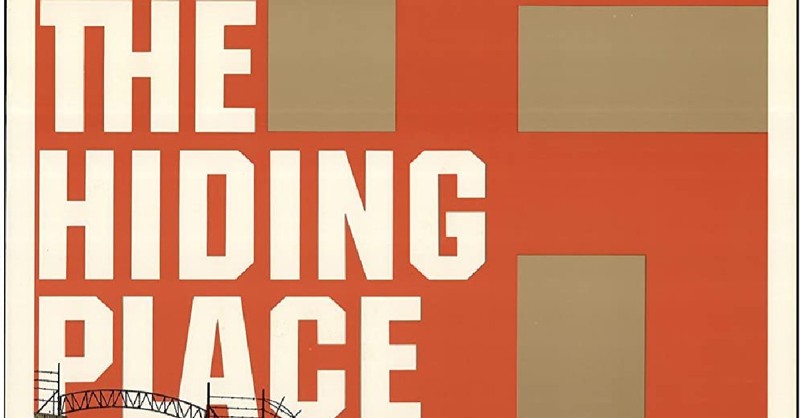
The Hiding Place (1975)
Another World Wide Pictures production by the Billy Graham Association released in 1975 is The Hiding Place, based on Corrie ten Boom’s autobiography. The film details the story of Corrie and her family, Dutch Christians who joined the Dutch resistance, hiding Jews in their homes to prevent their capture by Nazis during WWII.
The family was eventually discovered and arrested. Their father, Casper, died shortly after their arrest, while Corrie and her sister, Betsie, were sent to Ravensbruck Concentration Camp in Germany. The movie portrays the intense suffering in the camp at the hands of the Nazis and the comfort the women find in Jesus and God’s Word.
Betsie died in Ravensbruck. Due to a clerical error, Corrie was released shortly before her unit was sent to the gas chambers. She spent the rest of her life testifying to the presence of God in that place and the power of forgiveness. In the movie’s epilogue, Corrie concludes, “No pit is so deep that He is not deeper still.” This timeless and hopeful truth still speaks to viewers nearly fifty years later.
Jeannette Clift was nominated for a Golden Globe and a BAFTA for her portrayal of Corrie ten Boom. According to Christian Cinema, The Hiding Place remains the most popular film produced by World Wide Pictures.
Further Reading: 10 Holocaust Movies for Holocaust Remembrance Day
Photo Credit: ©World Wide Pictures
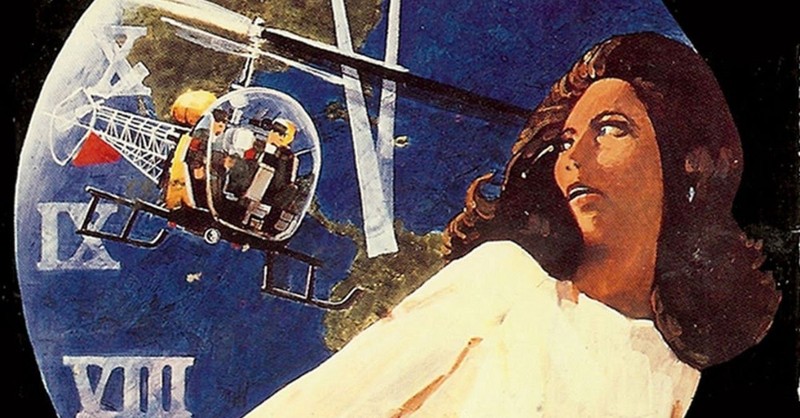
The Mark IV End Times Series (1972-1983)
The 60s and 70s brought “the dawning of the age of Aquarius” for many Americans, ushering in free love, sex, drugs, and rock-and-roll. Combined with the Vietnam War and the assassinations of President John F. Kennedy, Bobby Kennedy, and Rev. Dr. Martin Luther King, the 70s also spawned concern that the world was coming closer and closer to the God-ordained end. Several movies emerged with apocalyptic themes using sci-fi horror elements, hoping to capitalize on audiences fascinated by television shows such as The Twilight Zone.
A Thief in the Night (1972) and its sequels—A Distant Thunder (1978), The Image of the Beast (1981), and The Prodigal Planet (1983)—were largely played in churches to Christian audiences or as evangelistic tools (the gospel presented with a biblically inspired fear factor). Jim Grant, Russell S. Doughten, Jr., and Donald W. Thompson wrote the films. Iowa-based filmmaker Donald W. Thompson formed Mark IV Pictures, and directed and produced the films. These movies were some of the first films of their kind—forerunners to films like Revelation Road and Left Behind.
The films follow Patty Myers (Patty Dunning), a churchgoer who believes she’s a Christian but realizes one morning—when she wakes up to find her husband (and millions of other Christians) raptured—that she hasn’t entered a relationship with Jesus. The films follow Patty and others through the Great Tribulation until Patty is executed for refusing to take the mark of the beast in the series’ third film. The fourth film picks up other characters and adds elements of nuclear war to heighten the apocalyptic survival theme.
According to Christianity Today, A Thief in the Night alone was viewed by over 300 million people. Jesus music pioneer Larry Norman’s hit song “I Wish We’d All Been Ready” was key to the soundtrack. These films created a lasting desire for movies about the end times prophecies.
Further Reading: 5 End Times Movies that May Surprise You
Photo Credit: Mark IV Pictures Incorporated via IMDb
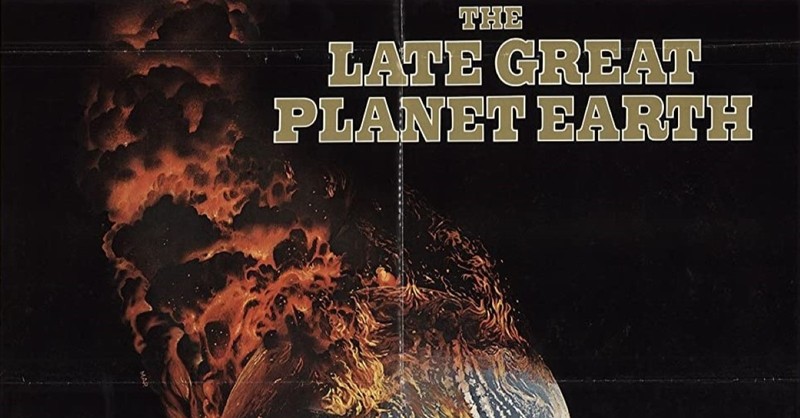
The Late Great Planet Earth (1978)
Based on Hal Lindsay’s 1970 book by the same title, The Late Great Planet Earth was a “docu-drama” depicting biblical prophecies leading up to the destruction of earth—“doom’s day.” The film was narrated by Orson Wells and produced to supplement the extremely popular book.
By the end of the 70s, there were reportedly over 10 million copies of Lindsay’s book in circulation. The National Endowment for the Humanities reports, “One subset of evangelicals, the ‘Jesus People,’ particularly responded to the message.” Again, because the Jesus Movement spurred new believers to read their Bibles and understand the message to be relevant to the times, prophecies took on a more immediate and personal fascination, as reflected in this and other films.
Further Reading: 10 Christian Movies about Martyrdom
Photo Credit: American Cinema Releasing via IMDb
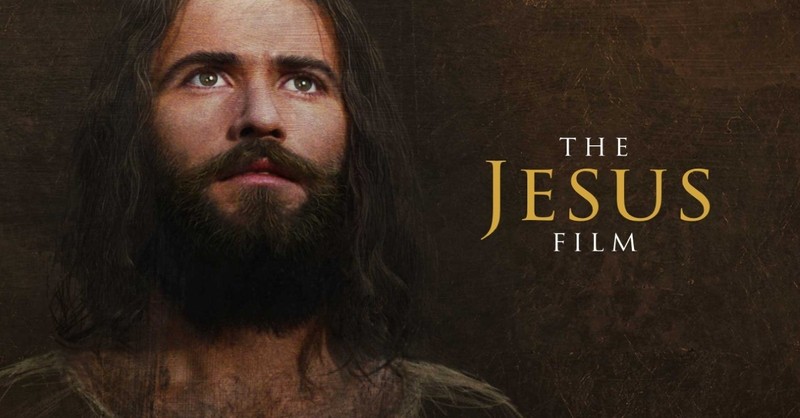
The Jesus Film (1979)
The decade concluded with a film based on the Gospel of Luke, largely financed by Campus Crusade for Christ (now Cru). The Jesus Film, in many ways a forerunner of The Chosen TV series, was filmed on location in Israel, with creators who worked to remain close to the biblical narrative.
The movie starred Brian Deacon as Jesus, Rivka Neuman as Mary, and Niko Nitai as Simon Peter. The vision of this movie was as an evangelistic tool and through The Jesus Film Project, the movie has been translated into over 2000 languages to date. According to the website, millions have seen the film, and over 600 million people have decided to follow Jesus because of it. As media and technology evolve, so will Christians’ desire to explore those mediums for spreading the gospel.
Christian movies have a place in portraying the lives of believers, spreading the gospel, and encouraging Christians. Young believers in the 70s brought their music and love of movies along when they came to Christ and began to revolutionize Christian film. Many early attempts now appear campy or canned but were a starting place on which future generations have built. The Jesus Revolution generation has grown up with film and now cares about creating Christian films with excellent art and compelling storytelling.
Further Reading: 10 Great Easter Movies about the Life of Jesus
Photo Credit: The Jesus Film Project



.jpg)

